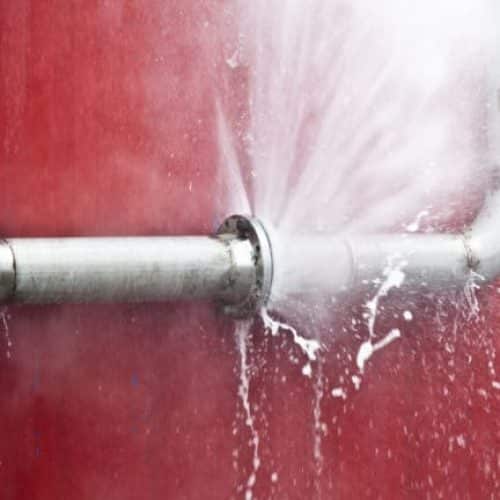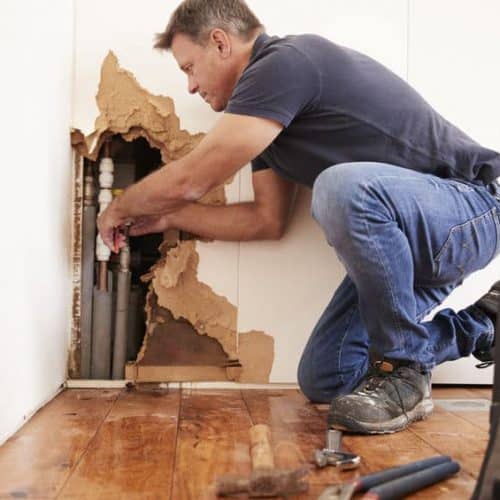Pipe Burst Attorneys
Pipe bursts can occur for a variety of reasons, from cold temperatures to old age and decay. They can happen anywhere, to anyone’s home. No matter how much water leaks into the house, a pipe burst can cause devastating damage to a home and the belongings within it. While some homeowners’ insurance policies don’t cover water damage that comes from weather events, most cover water damage that comes from a plumbing issue from within the house, including a pipe burst.

FREE CASE REVIEW
Home > Insurance Dispute Lawyers > Property Damage Attorneys > Pipe Burst Attorneys
Cases We Handle
However, many insurance companies are more interested in their bottom line than helping you. This means that they want to make a profit. Paying out a lot of money in claims when damage occurs eats away at those profits, no matter how much the claim is justified. Therefore, some insurance companies underpay or flat-out deny legitimate claims.
Because of the increased risk of cancer, especially lung, colorectal, and pancreatic cancer, the FDA announced the results of the trial to the public in January of 2020. Eisai didn’t believe that the results of the clinical trial showed an increased risk of cancer and thought that the benefits of the drug outweighed any risks. The FDA disagreed and asked Eisai to voluntarily recall the drug, which it did in February of 2020.
If your home has been damaged by a pipe burst and your insurance company has either denied your claim or paid out much less than the actual value of the damage, you may have a case against your insurance company. A pipe damage lawyer can help you figure out your next steps. Let Farah & Farah fight for the compensation and justice you deserve. Contact us now for a free consultation. You won’t pay a cent unless your case is successful.

What Causes Pipes to Burst?
A variety of factors can cause a pipe to burst inside a home. Some of these can occur no matter where you live, while others depend on your location. It’s important to ensure that your pipes and plumbing are well-maintained to try to prevent a pipe burst.
Common pipe burst causes can include:
Cold Temperatures
A pipe burst can occur if the temperature inside drops below 32 degrees Fahrenheit. In these conditions, the pipes can freeze, causing a pipe burst. As a precaution, when temperatures drop below freezing, people can open the cupboard doors of exterior pipes to expose them to the warmer air of the house. They can also let faucets connected to pipes in exterior walls drip to keep water flowing.
Corrosion and Rust
As pipes age, they can rust or corrode. Continual exposure to water can cause pipes to decay, so pipes located in moist parts of the house are more at risk. Steel pipes are even more prone to decay over time and thus homes built over 50 years ago, which are more likely to contain steel pipes, may be more at risk of a pipe burst.
Decay such as corrosion or rust can weaken the walls of a pipe. Weaker pipes are no longer able to withstand as much water pressure and are more likely to experience a pipe burst.
Moving Pipes
Over time, houses settle when the ground beneath the building’s foundation shifts. While this in itself is normal, it does cause the structure of the house to move. If anything within the house, such as the walls or floor, moves, that can cause the pipes to move. Movement of the pipes can gradually weaken the joints of the pipes until a pipe burst occurs.
Water Pressure
Pipes burst when the pipe can no longer contain the pressure of the water flowing through it. Anything that causes an increase in water pressure can cause a pipe to burst. The water pressure in a home can be too high overall or high water pressure can be localized and caused by a plumbing issue.
If the pressure is high across the board, a plumber can lower the pressure by installing a valve to keep the pressure below the maximum safe pressure of 60 psi. Most homes have a pressure between 30 and 50 psi.
Clogged Pipes
Clogged pipes can also raise the water pressure, causing a pipe to burst. A clogged toilet may just seem like an annoyance, but it can actually raise the water pressure to the point that a pipe affected by it bursts. A pump or a sink can also get clogged. It’s important to keep pipes clear so water pressure cannot build up enough to cause a pipe burst.
What Damage Can Be Caused By A Pipe Burst?
Whether a pipe burst results in a small leak or a large explosion of water, a lot of damage can occur. This ranges from damage to the pipe itself to damage to possessions or to the structure of the house.
Damaged Walls
If the pipe burst occurs, typically the first thing to get damaged is the walls. This can include causing structural damage to the wood and drywall. It can also damage the electrical wiring located nearby in the wall, which increases the risk of sparks that could cause a fire. If the pipe burst occurs on an exterior wall, there’s the risk of water saturating the insulation. Water could also seep through to the exterior of the house and cause damage to the stucco or siding or other building materials on the outside.
Damaged Floors
Any type of flooring can sustain water damage when a pipe bursts. Wood and linoleum flooring can crack or warp. Carpeting can get moldy and start to smell. Even cement flooring can be damaged by enough water. Water damage to cement can cause the floor to settle or even crack.
Mold and Mildew
Any time moisture gets into a house, there’s always a risk of mold. When a pipe bursts, whether it’s large or small, a lot of water can get into areas of the house. A small leak could release a large amount of water over time if it goes undetected. Mold can grow inside walls or in the carpet if the water from the pipe burst is not cleaned up quickly and thoroughly.
Mold doesn’t just smell bad. It can be a health hazard for the occupants of the house.
Electrical Damage
Pipes and electrical wires may be located inside the same wall. This means that if a pipe burst occurs, water could potentially leak out onto nearby electrical wires. If water reaches the wires, it could increase the risk of a spark. The same risk occurs if water from the pipe burst floods into the interior of the house. If the pipe burst occurs in the kitchen or a bathroom, water can damage nearby electrical appliances and the outlets where they are plugged in.
Water damage to electrical appliances and wires can increase the risk of a fire.
Flood Damage
If the pipe burst is large enough, the house can become flooded. In addition to damaging the structure of the house, water from the flood can damage possessions, resulting in the loss of items that may be irreplaceable. Plus, unless you have receipts from purchases, it may be difficult to prove the value of the loss to an insurance company, which may place a lower value on your belongings than they are worth.
$2+ BILLION IN RESULTS

Is Pipe Damage Covered By Homeowners Insurance?
One of the most common questions people have is, “does homeowners insurance cover pipe replacement?” What is covered depends on the insurance policy and the insurance company. Typically water damage from a pipe burst is covered, but there may be some caveats. For example, insurance may cover damage for sudden or unforeseen issues that led to a pipe failure. But known issues like rusty or leaky pipes may not be covered.
Additionally, some insurance policies contain a deductible that must be met before they’ll cover any of the repair or replacement costs. Other policies differentiate between the initial damage that is caused by the pipe burst and later damage that is caused occurs after the fact.
The insurance company should cover the costs for any professionals who come in to clean up the water and repair the damage. Your policy should cover repair to the walls, floors, carpet, paint, and more. However, it may not cover the repair of the pipe that burst and caused the damage in the first place.

Making A Pipe Burst Insurance Claim
If your home has been damaged by a pipe burst, it’s important to make a claim to your insurance company before you consider taking any legal action. It’s also essential to make the claim properly so that you don’t provide your insurance company with any excuse to deny your claim.
Assess the Damage
The first step is to assess the damage. Take pictures of everything so you have a permanent record of all damage. You should also have a professional come out and inspect the damage. Your insurance company will send out an adjuster to view the damage for themselves, but that inspection may be biased in favor of the insurance company. You should have an independent professional come in to perform a neutral inspection.
If you schedule the professional’s visit for the same time the adjuster is there, the professional can point out the damage and how much it will cost to repair the adjuster. Scheduling a professional inspection ahead of time, however, can provide you with the proof you need that the water damage was caused by a burst pipe, which is most likely covered by your insurance, rather than weather, which may not be.
Review Your Insurance Policy
Before making a claim, it’s important to know exactly what your insurance policy covers. You’ll want to know the exact process for submitting a claim and what evidence may be required to show the damage that occurred. You’ll also want to know exactly what you’ll have to pay first. Is there a deductible you’ll need to reach? Is the water damage covered but not the actual repair to the pipe itself?
Notify Your Insurance Company
It’s important to notify your insurance company as soon as possible. While there may not be a time limit on filing a claim, insurance companies may not pay for damage that results from waiting to repair. While something like a pipe burst can result in damage that isn’t necessarily noticed for a long time, such as mold or other water damage, if you wait to address the issue, the insurance company may claim that some of the damage was due to the wait and not want to cover everything.
Keep Maintenance Records
As the damage from the pipe burst is repaired, it’s important to keep detailed and accurate records of everything that was repaired. If your insurance company is reimbursing you for the cost of the repairs you have made, you’ll want to keep track of exactly what was done and how much was spent. If there’s a deductible on your insurance policy that needs to be met before the insurance company will start to pay for the repairs, you’ll need to be able to prove that the deductible was met.
What To Do If Insurance Denied Your Pipe Burst Claim?
Insurance companies are businesses. This means that even though you pay into a policy for years with the expectation that when you need it most, they’ll be there to cover damage to your home, the insurance company may be looking for any excuse to deny your claim. Sometimes, there’s a legitimate reason for a claim denial. But many claims are denied in bad faith by insurance companies that hope their customers won’t fight it.
Lack of Maintenance
It’s a homeowner’s responsibility to keep their home maintained. If proper maintenance wasn’t done on the pipes, causing them to burst, the insurance company may deny your claim. The pipe burst would be considered the homeowner’s fault if it was due to a lack of proper maintenance.
It’s important to have a professional inspect your property regularly to ensure that all proper maintenance is being done. Keep records of all maintenance that has been done on your home so that you can prove to the insurance company exactly what was done and when so they cannot claim that the pipe burst was due to a lack of maintenance.
Disagreement About Cause
The insurance company could also deny a claim if they disagreed about what caused it. The company may claim that the damage was caused by a peril that isn’t covered by the insurance policy instead of a peril that is. This is why it’s important for an independent professional to inspect the damage so that you can have proof that the damage should be covered by your policy.
Difference in Valuation
The insurance company may accept your claim but offer to pay less than what the damage would actually cost to repair. While this may be due to a deductible built into your policy, the insurance company may have also valued the damage at less than it actually cost. Having a professional inspect the damage independently of the insurance company’s assessment is important to have a thorough understanding of what the damage will actually cost to repair.
If your pipe burst claim was denied, hiring a lawyer who understands burst pipe insurance claims can help you seek the justice you’re owed.
Burst Pipes Attorneys in Florida & Georgia Who Are Ready to Serve Your Case
If your home has suffered water or other damage as a result of a pipe burst and your insurance company has denied your claim in bad faith or has paid far less than the damage is actually valued at, you may have a case against your insurance company. A lawyer can help you understand your insurance policy better so you know exactly what the insurance company should have covered. They can also help you fight for the maximum amount of money for the damage to your home.

Farah & Farah’s legal team includes highly experienced and qualified attorneys who excel at burst pipe insurance claims. Let us help you go after the compensation and justice you deserve. Contact us today for your free consultation. You won’t have to pay a dime unless your case is successful.














FREE CASE REVIEW
